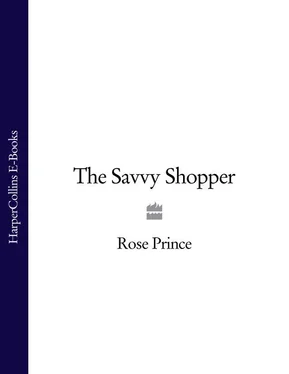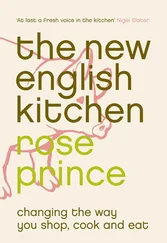Other conventional farmers blindly use every pesticide available to them, intensively rear animals in cruel systems and think only of the margins at the end of the day. The problem is that both types of conventional farmer dislike being put down as a bad farmer, even though only one has some justification in feeling this way. So organic standards get attacked – particularly, to my amazement, by the authorities. The Food Standards Agency, of all people, does not accept that the organic standard is one to strive for.
For shoppers, the problem is not how to choose organic food – if it has a Soil Association or other British organic logo, you can more or less rest assured – the real task is picking good conventional food out from the bad.
Organic always costs more. This is related to higher labour costs, slower growth rate of both livestock and plants, lower yields and the higher cost of ingredients in naturally processed foods. The only time I am wary of the pricing is when farm-gate prices of organic food match that of the same food in London shops. Sales at the farm gate should be cheaper than those that have gone through any middle man.
Animal welfare and disease
Animal welfare and disease should be grouped together because the latter is often a consequence of low standards in the former. Good animal welfare practice should include:
• Natural feed with a low protein content for slow growth, plus plenty of forage.
• Room to move – what is known in the business as low stocking density.
• Free access to outdoors in daylight.
• Good deep bedding, preferably straw.
• Access to plenty of water.
• Natural lighting.
• Freedom to behave naturally.
• No long road journeys.
• Low stress at slaughter, a rest beforehand and low noise levels.
The majority of farm animals never know a stress-free existence like this. As you will find out in this book, pig and poultry farms are especially intensive. With low stress, the incidence of disease is minimal. Viruses and bacteria spread in intensive rearing systems, and trucking livestock around the country does not help – as proven by the 2001 foot and mouth epidemic.
Eating meat is a big deal, and much respect is due to an animal that has been reared for food. With the emphasis on plentiful and cheap – a mantra followed in food supply for the last 50 years – the welfare of animals has somehow become unimportant to those who eat them. We have picked up some nasty habits: eating only the fillets and prime cuts as if the rest of the animal did not exist; eating a burger or chicken breast a day for just a few pennies; but, worst of all, a lack of curiosity. No one asks, so nothing changes.
Over the last decade, much time has been invested in debating how a fox should be killed, yet the majority of chickens we eat eke out their wretched existence in a broiler house, in conditions that should shame meat eaters. And animal welfare is a problem for vegetarians, too. Milk and egg production still see some of the cruellest practice in the food business. Dairy cows can spend their entire lives being unable to graze, going through lactation after lactation with all the inherent health problems that such a system can create.
Just a few questions when shopping for meat will make an enormous difference. There is much that shoppers can and should ask butchers and retailers before they buy. That is how free-range eggs found their way into supermarkets.
Finally it is worth bearing in mind that British animal welfare standards, while not good enough in the intensive farming sector, are still a vast improvement on welfare standards in Europe and elsewhere.
When shopping, keep one labelling legal loophole to the front of your mind: if a food has been grown or reared in, say, Holland but packed or processed in the UK, it can call itself British. So a side of pork that is cured in Holland and then packed in Britain is British bacon. EU competition laws prevent the real truth coming out on the pack, but responsible shops will often stick a Union Jack or recognisable British mark on the pack. Having said that, plenty of imported meat slips into ready meals and is never labelled as such. This matters mainly because animal welfare systems are even worse abroad than here, and some practices are still legal in other countries – even in EU member states – when they are banned in the UK. Food manufacturers do not always have to state the country of origin for fresh or processed foods, except in the case of controversial foods such as beef. The rule of thumb is this: if the country of origin is not stated, the food is probably not British. This is particularly so with fresh fruit and vegetables. Apples are plastered with Union Jacks when British are in season: otherwise they tend to be sold just as ‘apples’.
The free market and fair trade
Love it or hate it, the Western world is more or less open to trade, although the term free trade is an interesting two-way street, with different rules in each carriageway. Whether free trade is right or wrong, one thing is certain: aspects of it are grossly unfair both to us and to exporting countries. We import what are, in our terms, cheap goods with abandon; the exporting countries pay through the nose to do so via export levies.
Aid agencies campaign for trade barriers to be lifted between the West and developing or ‘third’ countries as a cure for poverty. If barriers were lifted on both sides, however, all hell would break loose. Under our current system, the West could ‘get there first’, meaning it would flood the poorer countries’ food supply chains with dumped goods grown under our subsidy system – it already does to an extent – negating the developing countries’ need to grow their own. It would also move in and set up business for export, which would likely make the few, rather than the many, rich.
But if, as aid agencies want, the trade barrier is lifted to favour only the developing countries, then – in terms of food – we may find ourselves unwittingly buying goods made to a standard that would not be permitted in the UK. This is already happening, between the UK and other EU member states, which are permitted to use production methods denied to us for food safety and animal welfare reasons.
British farmers operate under the most stringent food production rules in the world, and yet we are importing food that could not legally be sold if it had been made here. Because the majority of shoppers buy purely on price, lifting trade barriers to allow more cheap imports could spell the end of British farming and food production. Close the free market? No, we would put an end to centuries of culinary curiosity.
This is a case for shoppers to be circumspect about what they buy – and when they buy it. The sensible choice is to support British food production where standards are higher, as with meat; buy into our gluts of fruits and vegetables when they are in – avoiding the cheaper Spanish equivalent sitting beside it; and always buy with a mind to support small food businesses.
The worldwide commodity exchange has been held responsible for some of the appalling poverty among farmers in the developing world. When oversupply pushes prices down, farmers fall quickly into debt. In 1992 the Fairtrade Foundation was formed by CAFOD, Christian Aid, Oxfam, New Consumer, Traidcraft and the World Development Movement. They were later joined by the Women’s Institute. The idea of fair trade is for retailers to deal directly with farmers’ co-operatives or producer groups, committing to a minimum price in spite of supply. The stories emerging about fairly traded foods are encouraging – a case where changing shopping habits has had a positive effect on the lives of Windward Island banana farmers, Rwandan coffee growers and Palestinian olive oil producers. Beware, however, the attempts currently being made by giant food conglomerates to jump on the Fairtrade bandwagon and gain certification for one product while they continue to trade less ethically with the producers of all their other foods.
Читать дальше












